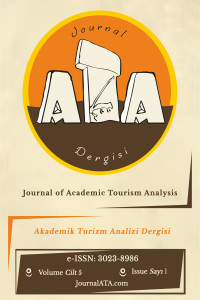Research Article
Reviews
Issue Reviewers




Aim & Scope
The Journal of Academic Tourism Analysis (Journal ATA) aims to to contribute to the development of the tourism discipline by including studies in the tourism discipline or interdisciplinary studies whose study subject and/or application is "tourism". In this way, it is aimed to contribute to the tourism discipline, to provide a scientific contribution to the practitioners in the tourism sector and (or) field, and to ensure the development of the tourism sector in the light of science.
Within the scope of the publication Journal of Academic Tourism Analysis (Journal ATA), provided that the study subject and (or) practice is related to "tourism", especially in the fields of Tourism Management, Tourism Guidance, Recreation Management, Culture, Gastronomy and Culinary Arts, interdisciplinary, theoretical, empirical and (or) case studies from the tourism sector.
Author Guidelines
Studies submitted to the Journal of Academic Tourism Analysis (Journal ATA) are subjected to a preliminary review by the journal editor in terms of form and content, and then sent to referees if deemed appropriate.
Studies such as research notes, article/book review, article/book review, and academic opinion (academic opinion only with the approval of the editor or (or) invitation) can be sent with the article.
All manuscripts to be sent to the journal should be written using the "Journal ATA Article Template" in the Microsoft Word program. When it is determined that the magazine template is not used; The studies will be returned to the authors for submission using the template before starting the process. The studies should be written in Times New Roman font style, 11 point font size, indent 1 cm per paragraph, 6 nk space after the headings and paragraphs.
The number of words in the article: should be between 4000 and 7000 in the first submission and between 4000 and 8000 in the final version after revisions (including tables, figures and references).
Attention should be paid to the fact that author information is not included in the text of the article. For this information, the "Title Page" in the journal templates should be filled in. Authors are responsible for the correct filling of the information.
The abstract should be written in Times New Roman, 9 point, justified and single-line spacing. The number of words in the abstract should be at least 150 and at most 200. If it is understood that these limits are not complied with, the study will be returned to make it complied with the specified limits before starting the process. The article can be written in Turkish or English. Regardless of the language in which the article is written, both Turkish (Öz) and English (Abstract) should be available (those who do not speak Turkish can request help to write a Turkish abstract (ÖZ) free of charge).
Keywords should be written in Turkish and American or British English (not a mixture of the two), avoiding general and plural terms and multiple concepts (eg "and", "/" etc.). Care should be taken not to use abbreviations (Only abbreviations that are strictly determined in the literature may be used.) These keywords will be used for indexing purposes.
Studies should consist of "Introduction, Literature Review, Method, Findings (for Empirical Studies), Conclusion and References" sections. Subtitles should never be used in the introduction.
First Level Headings should be written in Times New Roman, 11 point font size, bold, all capital letters, left-justified, followed by 6 nk spaces. Second Level Titles should be written in Times New Roman, 11 point font size, bold, the first letter capitalized, left-justified, followed by 6 nk space. Third Level Headings are not recommended. However, if you need to use it, it should be Times New Roman, 11 point font size, bold, initially capitalized, left-justified, followed by 6 nk space, as in the title.
Footnotes should be used rarely (never used if possible) and placed under the page column to which they refer. It should be written in font Times New Roman, 8 point font size, single space.
Tables are labeled as Tables and given a number consecutively (eg Table 1. Tourist Typologies). It should be prepared in Times New Roman, 10 point font size and the headings should be centered and placed on the tables. The texts in the tables should be Times New Roman and 9 point font size. References and notes should be left-aligned below the table.
Figures are tagged as Figures and given a number consecutively (for example, Figure 1. Purchase Decision Process). Photographs, graphs, charts or diagrams should be labeled (not abbreviated) as Figures. Figures should be prepared in Times New Roman, 10 point font size and the headings should be centered and placed under the figures. The texts in the figures should be Times New Roman and 9 point font size. References and notes should be found below the figure. Photographs and other visuals must be of good quality, drawings and texts must be legible.
Symbols and equations in the text should be consistent with the variable name and style. Equations should be indented on the left margin and numbered on the right margin, the equation number should be written in open and closed brackets () Time New Roman and 11 point font size. All symbols must be defined when they are first used. All equation symbols must be clearly and comprehensibly defined.
Our journal is scanned in various indexes and applies for new indexes. There are some sections that should be included in the articles in order to be scanned in these indexes. The forms to be filled for the information to be included in these sections are presented on our page. If the authors have statements that should be included in these sections, they should definitely leave these sections blank in the article template. This information will be added to the full text of the publication by the prepress layout editor. If they do not have a statement, the authors can fill in this part in the "Jornal ATA Article Template" in line with the directive in the relevant title. These sections;
- Acknowledgment; It should be specified in the “Acknowledgment Form” on the Journal Submission Documents page. This section should be short and at the end of the text before conflicts of interest.
- Conflict of Interest; It must be specified in the "Conflict of Interest Form" on the Journal Submission Documents page. This section should be short and at the end of the text before the authors' contributions.
- Contributions of Authors; It should be specified in the "Author Contribution Form" on the Journal Submission Documents page. This part should be short and at the end of the text before the ethical statement.
- Ethical Statement; Our journal should be stated in the "Ethical Declaration Form" on the Submission Documents page of the journal in accordance with the "Ethical Principles and Publication Policy" based on the document obtained from the relevant committee for studies requiring "Ethics Committee Permission" or for studies that do not require "Ethics Committee Permission". This part should be short and placed at the end of the text before the bibliography.
Journal ATA follows the citation style of the American Psychological Association (APA). For complete guidelines, please refer to the APA (Seventh Edition) Publication Handbook.
Journal ATA has its own reference style in Mendeley, one of the most popular reference management software products. It includes all products that support Citation Style Language styles. Using word processing plug-ins in these products, authors only need to select the appropriate journal style when preparing their articles, after which the citations and bibliographies are automatically formatted according to the journal's style. If you cannot find the style available for this journal, please follow the format of the sample references and citations shown in this Manual.
Mendeley desktop users should first go to the "View" menu, then to "Quote Styles" and "More Styles ...", then click the "Get More Styles" tab and type the following URL into the "Download Style" text box.
https://csl.mendeley.com/styles/459755961/JETouR
While preparing your article, you will be able to choose this style using Mendeley plug-ins for Microsoft Word or Libre Office.
Journal ATA requests an Extensive Summary (separately from the Abstract section) for the candidate studies in Turkish to be submitted as of 2021. This section should start with the Extensive Summary title on a new page after the references and should be between 800 and 1200 words in English. It should consist of the subtitles Introduction, Method, Finding, Conclusion. There should not be any other title than these. The EXTENSIVE SUMMARY title should be written in Times New Roman, 11 point, bold, all letters capitalized, left justified, followed by 6 point space. Subtitles should be written in Times New Roman, 11 pt, bold, first letter capitalized, left justified, followed by 6 nk spaces. The text should be written in Times New Roman, 11 point, Justified, 6 nk space after paragraphs. This section is not included in the article's word limit.
Ethical Principles and Publication Policy
Ethical Principles
Journal of Academic Tourism Analysis (Journal ATA) which are universal scientific and publishing ethical rules; RESPECT's EU Code of Ethics for Socio-Economic Research adopts the principles of "Code of Conduct and Best Practice Guidelines for Journal Editors" and "Core Practices" of the Publication Ethics Committee (COPE). In addition, our journal takes into account the Higher Education Institutions Scientific Research and Publication Ethics Directive. Based on these principles and rules, there are the responsibilities and rules that the editor, authors and referees should undertake in the publishing processes of our journal. These:
Editor's Responsibilities and Rules
- Editors should consider principles of RESPECT's EU Code of Ethics for Socio-Economic Research, "Principles of Transparency and Best Practice in Scholarly Publishing" and "Core Practices" of Publishing Ethics Committee's (COPE) and Higher Education Institutions Scientific Research and Publication Ethics Directive.
- Journal ATA accepts in advance the obligation to evaluate the articles proposed to the journal in terms of scientific content, regardless of the authors' ethnic origin, gender preference, nationality, religious belief or political philosophy.
- Journal ATA undertakes not to publish in violation of publication and research ethics, and all articles submitted to the journal are subject to plagiarism/similarity control by the editor.
- Journal ATA agrees to avoid any conflict of interest or competition that may arise between authors and referees.
- Uploading articles in Journal ATA, evaluation, printing and publishing, processing, page, color pictures and so on. No fees or other benefits are requested from the authors or elsewhere under the title.
- All publication rights in written and electronic media of the articles accepted and published in the journal belong to Journal ATA.
- Quotations can be made from the articles published in Journal ATA by showing the source. Searching for legal rights in copyright violations is the responsibility of the editor of the journal.
- Whether the article sent to Journal ATA is within the scope of the journal; is checked by the editor whether it has been uploaded to the system correctly/completely and whether the article has been prepared in accordance with the journal writing rules.
- For the articles accepted for publication, an informative e-mail is sent to the responsible author by the editor that the article has been accepted.
- The journal management is not a party to the conflicts that may arise over the authorship ranking after the article is published.
- The journal uses the information shared on the website such as name, title and e-mail addresses only for the specified purposes of this journal; do not use it for any other purpose or make it available to other people.
Authors' Responsibilities and Rules
- When submitting articles to Journal ATA, authors should consider principles of RESPECT's EU Code of Ethics for Socio-Economic Research "Core Practices" of Publishing Ethics Committee's (COPE) and Higher Education Institutions Scientific Research and Publication Ethics Directive.
- Submission of the Ethics Committee document is mandatory for the publication application of the articles that require the permission of the ethics committee. Researchers requiring Ethics Committee permission; All kinds of research conducted with qualitative or quantitative approaches that require the collection of data from the participants using a questionnaire, interview, focus group study, observation, experiment, interview techniques, use of humans and animals (including material/data) for experimental or other scientific purposes, clinical studies on humans researches, researches on animals are retrospective studies in accordance with the law on the protection of personal data.
- In the case of reports, it should be stated that the "Informed Consent Form" was obtained.
- Permission must be obtained from the owners for the use of scales, questionnaires and photographs belonging to others and must be specified.
- It must declare that the copyright regulations for the intellectual and artistic studies used are complied with and that the copyrights of the study have been transferred to Journal ATA with the "Copyright Form".
- Whether the ethics committee permission and (or) legal/special permission is required for the articles to be published in the journals should be stated in the article. If these permissions are required, it should be clearly presented from which institution, on what date and with which decision or issue number the permit was obtained.
- Retrospective ethics committee approval is not required for articles that have used research data before 2020, produced from master's/doctoral studies (should be specified in the article), submitted a publication application to the journal in the previous year, accepted but not yet published.
- Researchers who are not members of the university can apply to the Ethics Committees in their region.
- Copyrighted material such as tables, figures or other contributing quotations in Journal ATA is published only with valid permission and copyright approval and this responsibility belongs to the author(s). In studies, permission should be obtained from the owners for the use of scales, questionnaires and photographs/visuals belonging to other researchers. Authors should cite other authors, contributors or sources appropriately and cite relevant sources.
- The author(s) should declare and undertake that the article submitted to Journal ATA to be evaluated for publication has not been published anywhere in Turkish or any other language before, has not been accepted for publication and has not been sent to another journal for publication. Authors should ensure the originality of their submitted manuscripts.
- All kinds of legal and scientific responsibility regarding the contents of the articles published in Journal ATA belong to the author(s).
- The article in question cannot be published in another journal or language without the written permission of the journal management.
- Author(s) who want to request to withdraw their studies at the evaluation stage must fill in the "Manuscript Withdrawal Letter" containing the reasons for withdrawal, have all authors sign it, and upload it to our journal's article upload page on the DergiPark system to be submitted to the editorial board. The Editorial Board reviews the withdrawal request and responds to the author(s) within 15 days. Unless the withdrawal request is approved by the Editorial Board, the author(s) cannot send their studies to another journal for evaluation.
- The author who takes the responsibility for the article submitted to the journal, the communication process with the journal and the post-publication processes on behalf of the other authors are accepted as the "corresponding author" by Journal ATA. It is assumed that the corresponding author has reached an agreement with the other author(s) in the whole process of the article.
- The corresponding author is obliged to inform the authors about the process and evaluations regarding the article.
- In addition to the normal article evaluation process, 30 days for minor revision; 60 days for major revision and 90 days for articles requiring major revision by more than one referee are given a maximum additional period of 90 days.
- The evaluation period of the text sent to the corresponding author for final reading is 3 days.
- In articles based on master's or doctoral theses, the student and the advisor (second legal advisor, if any) who prepared the thesis are considered as the natural authors of the article. In case the thesis student wants to prepare an article based on his thesis with a single author, he is expected to receive the "Authorship Disclaimer Form" from his supervisor, which states that he has waived his authorship, and send it to the editor of the journal with the article. In case the thesis supervisor wants to prepare an article based on the thesis study with a single author, he must receive a waiver letter from the thesis student and submit it.
- The management of the journal expects the authors to comply with the authorship rights and internationally valid rules in author ranking in the articles proposed to the journal. In the articles based on the graduate thesis, the thesis student is ranked first, the thesis supervisor as the second, and if any, the second supervisor as the third.
- In the event that the author(s) notices a mistake or error in the evaluation and early viewing stage or related to the published studies, they have an obligation to cooperate with the journal editor in withdrawals.
Responsibilities of Referees and Rules to Follow
- Referees should consider principles of RESPECT's EU Code of Ethics for Socio-Economic Research, Publishing Ethics Committee's (COPE) Ethical Guidelines For Peer Reviewers and Higher Education Institutions Scientific Research and Publication Ethics Directive.
- Studies sent to referees for evaluation should be kept confidential. Studies should not be shown to others and their content should not be discussed. The privacy rule also covers people who refuse to act as an arbitrator.
- Referees cannot use the unpublished studies or parts of the studies submitted for evaluation in their own studies without the written consent of the author(s). Information and ideas obtained during the evaluation should be kept confidential by the referees and not used for their own benefit. These rules also cover people who do not accept the role of arbitrator.
- A referee who is invited to make a referee evaluation must inform the editor within 5 days whether he can referee for the relevant studies. Those who accept to act as a reviewer must complete the evaluation process within 15 days, and authors within 15 days of the changes notified to the corresponding author.
Publication Policy
- Journal of Academic Tourism Analysis (Journal ATA) is a peer-reviewed journal and is published twice a year as of 2021.
- A double-blind peer review system is used in Journal ATA. In order to evaluate the publications, at least three referees are appointed by the editor of the article according to the content of the studies and the expertise of the referees. At this step, all referee evaluation reports are sent electronically and anonymously. The names of the referees who made the review are not specified by the journal in order to protect the integrity of the double-blind refereeing process. Authors cannot contact referees directly, evaluation and referee reports are submitted through the journal management system. In this process, evaluation forms and referee reports are sent to the responsible author through the editor. The final decision is made by the Editorial Board so that all articles with at least two "positive" referee views can be published.
- If requested, a written document stating that the referee contributed to the journal can be given to the referees.
- Journal ATA publishes scientific studies prepared in Turkish and English languages. Using the TÜBİTAK ULAKBİM DergiPark system, it publishes at https://dergipark.org.tr/en/pub/atadergi. All transactions related to the article are carried out through the DergiPark system.
- All articles are open access and fully comply with open access guidelines; It is possible to read without a journal user.
- Journal ATA does not pay royalty fees for articles.
- Journal ATA does not accept articles for a specific issue. Articles can be sent to the journal at any time.
- Criticism, error correction, etc. about an article published in the journal. manuscripts are published in the first issue following the date they are accepted after the editor/referee evaluation.
- However, in order for such articles to be considered, they must meet the scientific/academic content, features and form conditions.
- In order to encourage new and original topics in the articles proposed to the journal; Climate studies, the relations of tourism with the environment, interdisciplinary studies based on tourism, studies examining the relations of tourism with philosophy, sociology, psychology and anthropology are primarily published.
Journal ATA is licensed under CC BY-NC 4.0.


